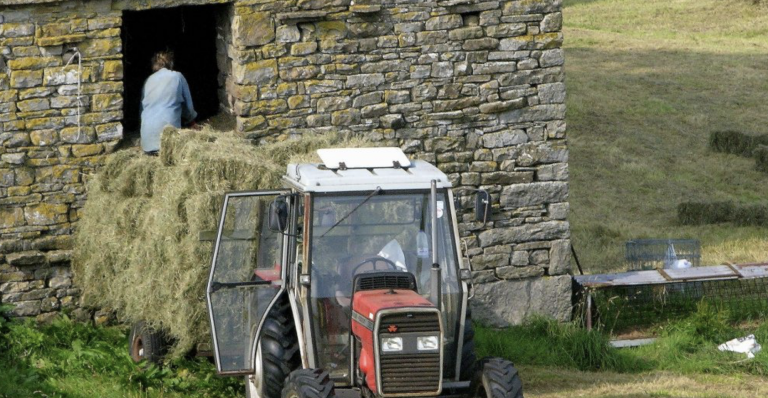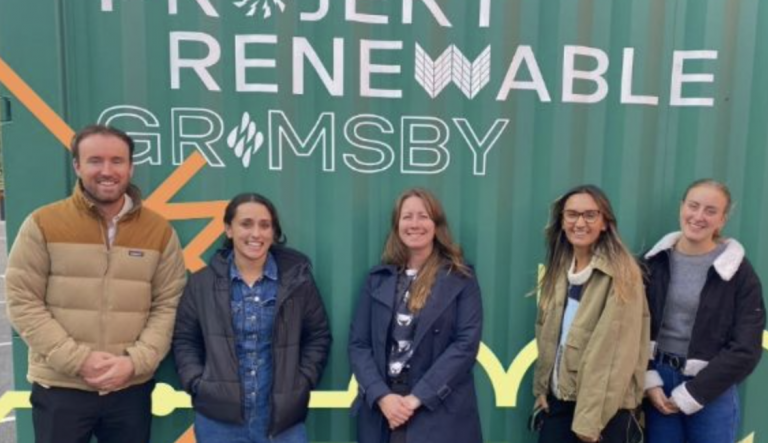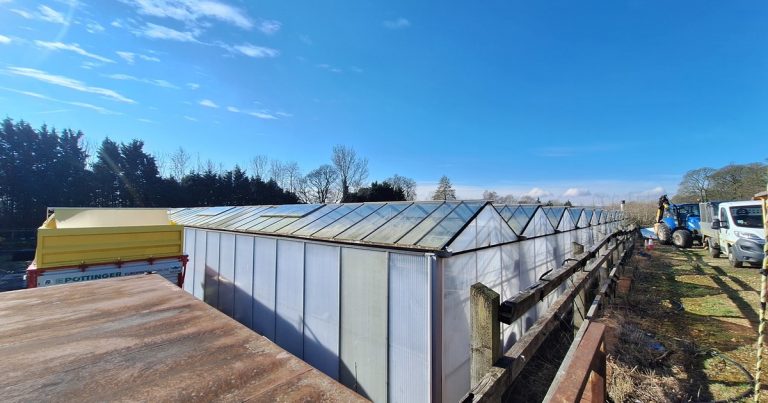- Provide £2m of grants to the National Park’s farmers and landowners through the Farming in Protected Landscapes programme.
- Continue the Tees-Swale project, restoring peatland, hay meadows, woodland and other priority habitats across Swaledale and Arkengarthdale.
- Provide new, Education and Outreach projects: Championing National Parks for everyone, and the National Citizen Service project.
- Facilitate an extensive volunteers programme, young ranger, ‘Upskill Down Dale’ youth engagement programme, and apprenticeships, developing skills that lead to employment in the environmental sector.
- Implement the Coast to Coast National Trail through the National Park, and a variety of other ambitions.
Yorkshire Dales farmers to be offered share in grants totalling £2m
Works progressing on next phases of Lincoln Enterprise Park
Construction works to deliver the next phases at Lincoln Enterprise Park are progressing to schedule with 80% of space already reserved.
Located on the A46 near Thorpe on the Hill, Lincoln Enterprise Park is progressing with phases 7 to 10, which will bring an additional 34,500 sq ft to the park and could potentially create up to 100 new jobs.
Following the continued demand for commercial property in and around Lincoln and a successful planning appeal in 2021, developer and site owner LEP Developments commenced works in October last year, acting as both developer and contractor.
With groundworks done, steel frames ups and roofs complete, works to phases 7 and 8 – which are 6,500 sq ft each – are on schedule.
In total, phases 7 to 10 will bring 13 new mixed-use units ranging from 1,451 to 11,500 sq ft to Lincoln Enterprise Park, offering in-demand expansion opportunities for current occupants and new commercial premises for other businesses.
Current occupant and bespoke kitchen and furniture manufacturer, Krantz Designs, has been on Lincoln Enterprise Park since 2020. With its expanding client portfolio and desire to manufacture all its products in-house, the company has bought phase 7 as well as securing the lease of part of another unit as part of phase 9, giving the company a total of 20,000 sq ft at the park.
Managing director of Krantz Designs, Jamie Krantz, said: “With our showroom on historic Bailgate in Lincoln, we currently manufacture about 90% of our products here at Lincoln Enterprise Park, but for some time have wanted to increase that to 100%.
“We had no desire to move from the park as it’s the perfect location for us, is well managed and has a supportive business network, therefore when Nick secured planning for the next stage of expansion, I jumped at the chance to design and build our new HQ.
“We will have approximately 30 skilled team members at the park when we move into our new spaces later this year, which will include CAD technicians, cabinet painters, machinists and office personnel, and we will be recruiting in due course to fill new roles. The team and I are pleased to be continuing our journey at Lincoln Enterprise Park.”
Managing director of LEP Developments, Nicholas Falkinder, said: “At Lincoln Enterprise Park we support economic growth by providing our premium product in a unique and highly accessible location.
“Because of what we have on offer here and the service we provide, we have been fully occupied for over seven years. Jamie and the team at Krantz Designs are a great example of the business community at the park and how we support those businesses through leasehold agreements, then on to freehold opportunities if required.
“From the outset interest in the new units has been high and this resulted in 80% pre-construction sales in just a matter of months. The majority have been taken by existing occupants, which is what we strive for, and we are welcoming some exciting new businesses later in the year.
“I’m passionate about this park and its success, and for the first time we are developer and contractor, which is an incredible journey to be on to both ensure quality and see the progress onsite each day. I want to thank our community of businesses here and everyone who has made these next phases possible.”
Phases 7 and 8 are due for completion in the summer this year, phase 9 in early autumn and phase 10 in early 2025. Two units remain available to rent or buy and are being marketed by local agents Pygott & Crone and Lambert Smith Hampton.
All contractors working on the site are East Midlands-based and include CM Civils, a Lincoln-based civil engineering company which has delivered the groundworks.
Subject to planning, there is scope for further expansion at Lincoln Enterprise Park.
Crown Estates confirms Projekt Renewable support by becoming a patron
The Crown Estate has officially registered its support for Grimsby’s Projekt Renewable by becoming a patron.
With a £50,000 investment now committed to further expand Grimsby’s Alexandra Dock-based Projekt Renewable, Director Richard Askam said: “Ever since I first floated the idea of Projekt Renewable to The Crown Estate, they have been so supportive of the logic and drive that lies behind what we are doing. To have The Crown Estate come onboard in 2024 as a #projektpatron and take a space at Projekt which is being designed to further everyone’s knowledge of marine conservation is just brilliant.”
Chelsea Bradbury, Senior Marine Data and Insights Manager with The Crown Estate, added: “We’re thrilled to build on our prior support of Projekt Renewable Grimsby with a financial investment, giving us a physical presence in the local community.
“Through this partnership, we want to make sure everybody in Grimsby and beyond is proud of what’s on their doorstep by showcasing the activity taking place on the seabed to reach net zero and the amazing work being done to protect and enhance nature and marine habitats.
“Potentially even inspiring more people to look at careers in this space. As an offshore wind hub, Grimsby is the perfect location to spark people’s imagination and curiosity, and we’re excited to work with the local community to understand what they would most like to know and learn about this industry.”
The Crown Estate manages land, the seabed and much of the coastline around England, Wales and Northern Ireland on behalf of the nation, creating long-term value for the country. It is focused on supporting the UK’s energy transition and improving energy security alongside stewarding the protection and restoration of nature. One of the ways it does this is by sustainably developing the seabed to support green, renewable energy industries, such as offshore wind. This partnership provides an exciting opportunity to connect people in Grimsby more closely with its role as manager of the seabed.
An aspirational beacon for Grimsby and beyond, Projekt Renewable was always built with the view to extend and evolve to suit the demands of both the local community and the renewable champions operating within the area. To have The Crown Estate officially join its trio of boxes is an incredibly proud moment for the entire Projekt team.
Grade II listed Kitson House sold breathing new life into the building
Lambert Smith Hampton (LSH) has sold Kitson House, an iconic Grade II listed country house forming part of the Elmete Hall site, to Industruct Limited.
Situated in Roundhay along with the neighbouring Nicholson House, an affluent and diverse northern suburb of Leeds, the 5,700 sq ft property borders Roundhay Park, one of the largest city parks in Europe attracting nearly one million visitors each year.
The historic building has seen extensive redevelopment over the years, whilst maintaining many of the original period features including the peacock cupola dome lighting and cast-iron circular staircase in the main hall.
The adjacent Nicholson House (6,996 sq ft) is still available for sale. Both properties are currently utilised as offices, offering versatile potential for redevelopment across various sectors subject to planning.
Matt Procter, Surveyor at Lambert Smith Hampton, said: “We are delighted to have found a new owner for this historic site in the heart of Roundhay.
“The sale of Kitson House underscored the appeal of heritage properties in desirable locations, and we look forward to seeing the property’s continued revitalisation along with the potential offered by the neighbouring Nicholson House.”
York Handmade plays key role in London development
Paul brings together experts to support efforts with workplace mental health
Former trawlerman Paul Longley who set up his own consultancy to turn the tide on mental health issues in the workplace has put together a team of experts to help employers communicate with colleagues.
Paul Longley, who spent 32 years in the fishing and food industries before being made redundant in 2019, has recruited Scott Clark and Leon McQuade, co-founders of tech and cyber security specialist Think Cloud, as partners in Think GiANT. The directors of the new business, which is based in The Deep Business Centre, also include Christina Colmer-McHugh, a mental health advocate and inventor and founder of the Moodbeam real-time happiness surveying tool. Paul, a former employee of Andy’s Man Club who set up his own mental health first aid training company in 2020, said: “I left school with no qualifications at all and my first job was on the trawlers, following in my dad’s footsteps. I later moved into fish processing but when I was made redundant I took the opportunity to go to college and train up in mental health first aid. “I’d been struggling with my own mental health for over 20 years. Thanks to attending Andy’s Man Club, those overwhelming weeks and months have turned into difficult hours and minutes that I now have the tools to manage, and that enabled me to set up Think Mental Health. “Through that, I have worked with businesses in 23 countries which between them employ about 250,000 people. Speaking to the leaders and the managers of those companies, I find they all have a passion to support their employees but sometimes they don’t know how to do that. I spotted a gap in communication, and I knew the GiANT toolkit could massively help with that.”Small firms to be offered free advice at HR workshops
Invest East Yorkshire and Invest Hull are jointly staging a series of free HR workshops to support small business owners.
The free workshops have been developed to enable small business owners to maximise their efficiency and effectiveness when managing people so that they can harness the full potential of their workforce, ensuring that they’re better positioned for sustainable growth and success. Course leader Helen said: “We know that human resources and dealing with people challenges can often fall to the bottom of the to-do list for time-poor small business owners. It’s just one of many different roles that they have to fulfil. However, it’s well worth devoting time to making sure you fully understand what’s required of you and have appropriate and effective policies and procedures in place. Dealing with people issues in the right way will help protect you and your business, legally and reputationally. “These free workshops are a great opportunity to boost your knowledge, and pick up some useful tips and insights. Don’t miss this chance to transform your approach to human resource management; register now for these empowering workshops and take a confident step towards success!” Taking place over the coming weeks, the workshops will cover a range of useful topics, including how to recruit with confidence; methods for managing sickness and absence; and performance management strategies. They will be held online and in person at venues across East Yorkshire, with the first one taking place at Brough Business Centre on Thursday 7th March, from 10.30am to 1.30pm.











